By Tech Powered Dad | December 8, 2014
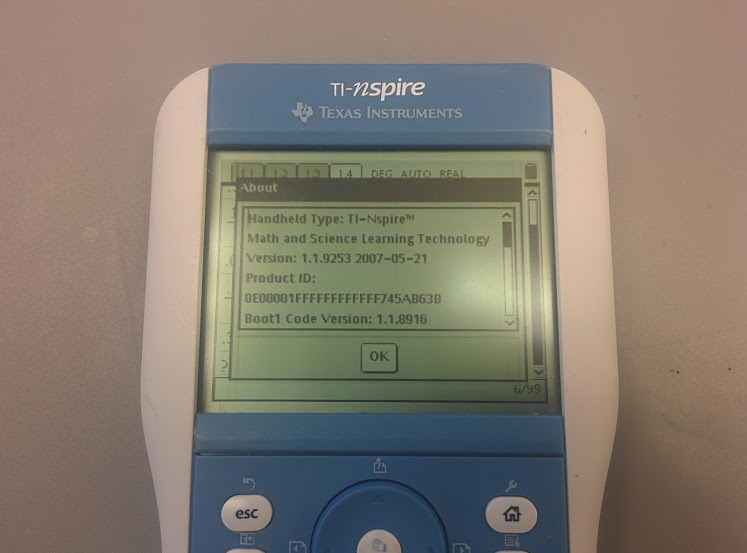
I need to preface this story by saying that this is something that happened over 6 months ago. I took the pictures at the time but started my online data science studies shortly thereafter and just never got around to writing the story, but it was such an unusual thing that probably once a month I’ve continued to think about writing it up.

During my years of teaching at my school, I’ve been the guy who troubleshoots all of the graphing calculator problems for teachers and students alike. That includes what I’d call “unusual” upgrade problems. If you’ve upgraded enough TI-Nspires (and I’ve probably upgraded a couple thousand times over the years), I don’t need to tell you that while the process is typically very smooth for 2.0 and above, sometimes older versions of the OS are stubborn. The Nspire may refuse to upgrade for many attempts, it my require a full system wipe, and on rare occasions, the upgrade bricks the device.
Sometimes students purchase older used Nspires on eBay or Amazon to save a few bucks. This is generally no problem, as TI has provided upgrades all the way back to the original TI-Nspire Clickpad. At our school, we want everyone running the same operating system, so we upgrade them to the latest version immediately. If a kid shows up with a version older than 2.0, generally 1.4 or 1.7, my colleagues bring the Nspire to me to oversee the upgrade process.
So back in the spring, my math team assistant coach popped into my room and said, “I need help with an Nspire upgrade. I’ve got a kid that showed up with 1.1.” I told him he must be mistaken. Could he mean 1.4? “No,” he said. “I’m pretty sure it’s 1.1.”
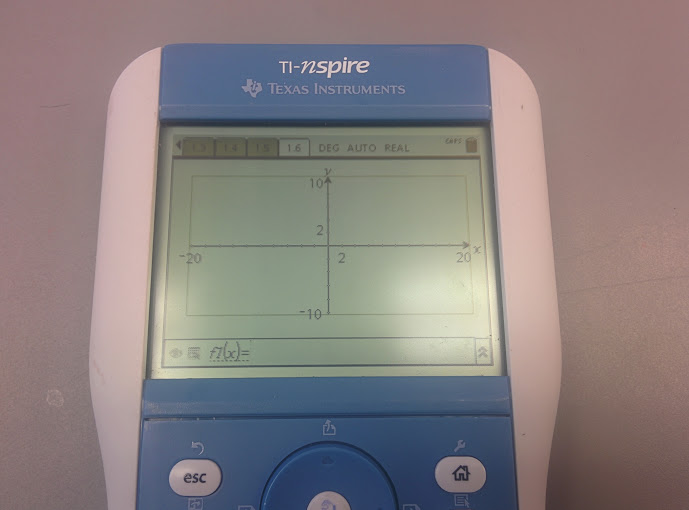
This got my attention. I mean, I assumed there must have been a TI-Nspire OS 1.1 and 1.2 at some point, but I’ve never seen them, and I’ve been looking at these devices pretty much since they were first released. I took a look the student’s TI-Nspire and sure, enough, OS 1.1. Looking around at the menu and options, things didn’t look substantially different than what I’ve seen on the much more common 1.4. The home screen was pretty much the same. The graphing window did look a bit different, but that could just be too much time spent on modern versions of the OS. I didn’t have a TI-Nspire with OS 1.4 handy for comparison.
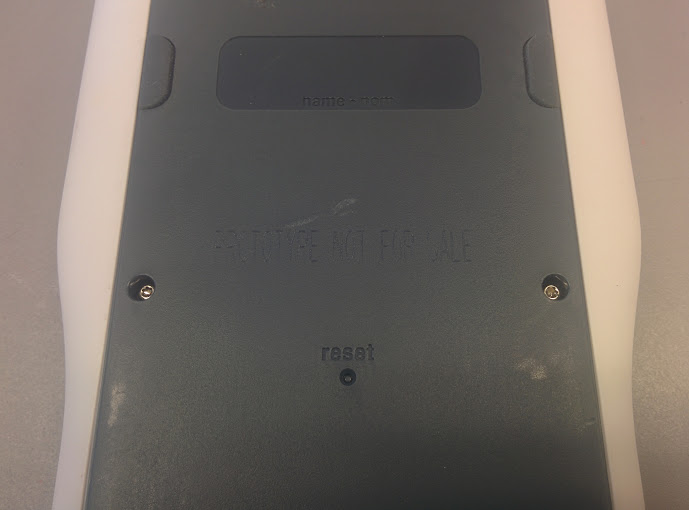 Close inspection of the back of the Nspire reveals the words: “PROTOTYPE NOT FOR SALE”
Close inspection of the back of the Nspire reveals the words: “PROTOTYPE NOT FOR SALE”
The second big surprise came when I did a visual inspection of the hardware itself. Clearly engraved on the back of the TI-Nspire were the words: “PROTOTYPE NOT FOR SALE.” Where did this thing come from? We asked the student himself, and he said his parents had purchased it used from a third party seller on Amazon.
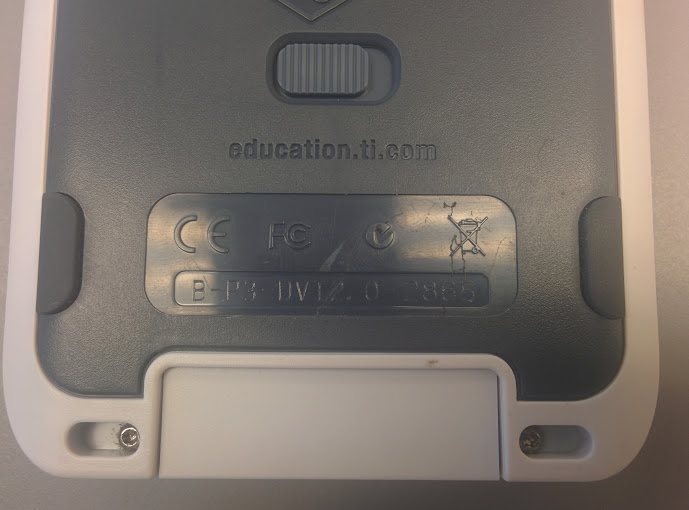 At this point, I guess I had a couple of options. I could have offered to buy the unit from the parents at whatever minimal cost they had paid on Amazon and made it a collector’s item. The other alternative was do what I always do in these situations: attempt to upgrade the operating system. Although both of these options had potential drawbacks (I don’t know a single person outside of the teaching job I’m leaving that I could show a collectible TI-Nspire to, but I also wasn’t sure if it would be be possible to a unit like this up to the present OS), I didn’t consider the former for long. I didn’t love the idea of buying a calculator from a student and their family–seemed like it would be an awkward conversation.
At this point, I guess I had a couple of options. I could have offered to buy the unit from the parents at whatever minimal cost they had paid on Amazon and made it a collector’s item. The other alternative was do what I always do in these situations: attempt to upgrade the operating system. Although both of these options had potential drawbacks (I don’t know a single person outside of the teaching job I’m leaving that I could show a collectible TI-Nspire to, but I also wasn’t sure if it would be be possible to a unit like this up to the present OS), I didn’t consider the former for long. I didn’t love the idea of buying a calculator from a student and their family–seemed like it would be an awkward conversation.
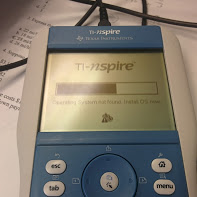
So I charged ahead with the upgrade process. After all, this student couldn’t realistically have used 1.1 with his classmates, as it was missing many, many features that are daily parts of our instructional process. For a while, everything went fairly smoothly. I had to do the upgrade incrementally. Going to 1.4 to 2.0 to 3.0. Some of the upgrades were painfully slow and took a couple of tries, but it seemed to be working fine. However, when I tried to push it past 3.0, disaster struck. When the Nspire rebooted, I saw the infamous gears of death. Doing a factory reset and wipe didn’t help.
As a Hail Mary, I called Texas Instruments support. TI’s customer support is excellent, but I’ve been troubleshooting these devices long enough that I don’t usually have to call unless there’s a pretty significant problem. I explained the situation, that I had a student with a prototype device that had OS 1.1, which I had successfully updated to OS 3.0, but when I pushed beyond that, I saw the gears symbol and was prompted for an operating system installation, which wasn’t working. The friendly female voice on the other end was clearly caught off guard, “I’m going to have to put you on hold for a minute. This is a new one for me.”
Five minutes or so later, she came back on to tell me what I already suspected, that there was nothing else that could be done. As she explained it, the hardware in the prototype unit was slightly different that the ones that eventually shipped for retail. It couldn’t handle OS 3.2 or above.
And that’s pretty much the end of the story for this unit. The student successfully shipped it back and got a refund from the Amazon seller since he or she had sold the family something different than what they had claimed. I doubt I’ll ever see such an unusual TI-Nspire “in the wild” again. I’m sorry the device came to such an unfortunate end.
POSTSCRIPT:
Shortly after I posted this article, I heard from TI wizard Adrien Bertrand, who runs the website TI-Planet. He made me aware that the problem of updating prototypes such as this one is not unheard of, and it can be done with a special procedure. TI-Planet has a tutorial up on how to do this upgrade (in French). Check it out here

